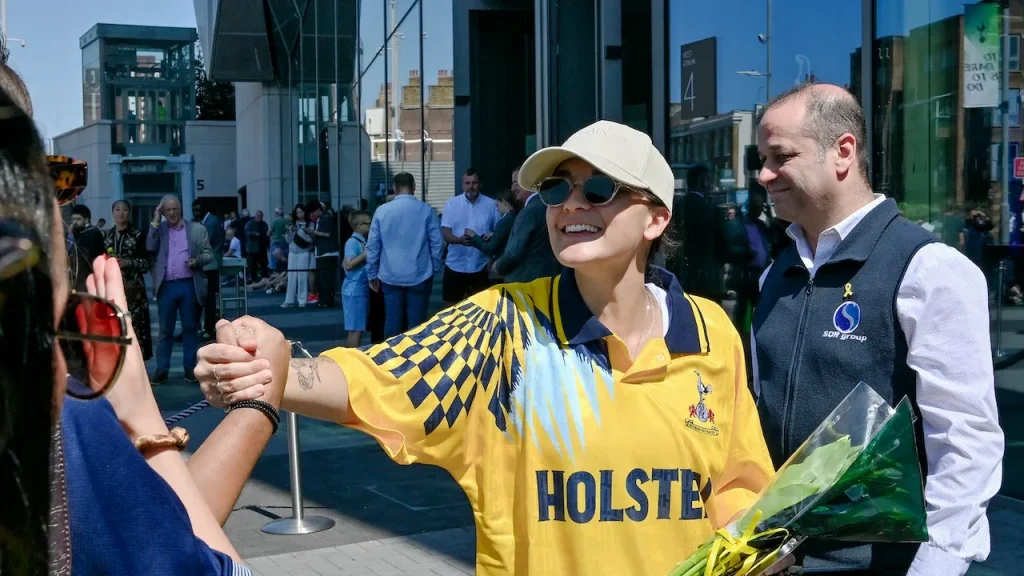British-Israeli Woman Barred from Soccer Match Speaks Out on Discriminatory Ban
Emily Damari, a British-Israeli woman who survived captivity by Hamas until her release in January, has found herself facing another unexpected ordeal—being denied the opportunity to watch her beloved soccer team, Maccabi Tel Aviv, play in England. Aston Villa, the English opponent, announced that all Maccabi Tel Aviv fans would be prohibited from attending the upcoming Europa League match in Birmingham on November 6, citing safety concerns amid ongoing pro-Palestinian protests. For Damari, a self-described “die-hard fan,” this decision feels deeply personal and unjust. “I am shocked to my core with this outrageous decision,” she wrote on social media. “Football is a way of bringing people together irrespective of their faith, color or religion, and this disgusting decision does the exact opposite.” Her emotional response resonates with many who see the ban as discriminatory, with Damari herself drawing a troubling parallel: “This is like putting a big sign on the outside of a stadium saying ‘No Jews allowed.’ What has become of the UK where blatant antisemitism has become the norm?”
The decision has sparked significant backlash from British government officials, including Prime Minister Keir Starmer, who called it “the wrong decision” and emphasized that “the role of the police is to ensure all football fans can enjoy the game, without fear of violence or intimidation.” A spokesperson revealed that the Prime Minister was “angered by the decision” and that the government was working urgently to overturn it. Local officials have also pushed back, with Birmingham’s police oversight official Simon Foster calling for an “immediate review” and Mayor Richard Parker urging authorities to find a “workable solution.” This unified political response demonstrates the controversial nature of the ban and raises questions about whether security concerns justify what many perceive as collective punishment against Israeli fans.
The situation reflects growing tensions surrounding Israeli sports teams competing internationally since the Gaza conflict intensified. Last year, Maccabi Tel Aviv supporters were reportedly targeted in violent incidents in Amsterdam during a match against Ajax, resulting in multiple arrests and convictions. More recently, pro-Palestinian protesters have become common at Maccabi Tel Aviv games in 2025, including demonstrations at their match against PAOK in Thessaloniki, Greece, on September 24, where around 120 Israeli fans required police protection. Aston Villa defended their decision in a statement, emphasizing “continuous dialogue with Maccabi Tel Aviv and local authorities,” while prioritizing “the safety of supporters attending the match and the safety of local residents.”
This pattern of restrictions on Israeli sports participation extends beyond soccer. The Indonesian government recently denied visas to Israeli athletes for the 53rd FIG Artistic Gymnastics World Championships in Jakarta. Similarly, the Israel Premier Tech cycling team was excluded from the Giro dell’Emilia race in Italy due to concerns about potential pro-Palestinian protests. In September, UEFA, Europe’s leading soccer governing body, was reportedly considering suspending Israel from competition because of the Gaza conflict, though FIFA President Gianni Infantino ultimately announced on October 3 that no action would be taken against the team. These incidents collectively raise concerns about whether legitimate security considerations are being used to justify discriminatory practices against Israeli athletes and fans.
For Emily Damari, the pain of this exclusion is particularly acute given her personal history as a former Hamas captive. Having endured traumatic circumstances during her captivity until her release in January, she likely viewed attending the match as part of her recovery and return to normal life. Sports often serve as a healing mechanism for those who have experienced trauma, providing community, joy, and a sense of normalcy. Being denied this opportunity compounds her suffering and raises questions about whether security measures are being implemented in ways that unfairly target individuals based on their nationality or religion. Her public statements reflect not only disappointment but a deeper concern about growing antisemitism in British society.
The controversy emerges against the backdrop of broader geopolitical developments, including the recent ceasefire between Israel and Hamas overseen by former President Donald Trump. This agreement resulted in the release of the remaining 20 living hostages held in Gaza in exchange for nearly 2,000 Palestinian prisoners and detainees. While diplomatic progress has been made on the international stage, incidents like the Aston Villa ban demonstrate how the conflict continues to reverberate through seemingly unrelated aspects of civil society, including sports. The situation highlights the complex intersection of security concerns, anti-discrimination principles, and the right of all people to participate in cultural and sporting events regardless of their nationality—complexities that remain unresolved as Damari and other Maccabi Tel Aviv fans await a final decision on whether they’ll be allowed to support their team in person.


